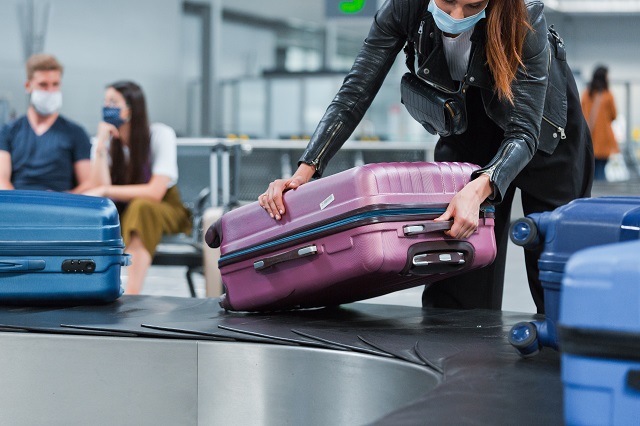
Credit: izusek / Getty Images
The pandemic has been a catastrophe for tourism and travel, upending an almost $9 trillion industry that once accounted for approximately 330 million jobs around the world. And there continues to be great uncertainty about what the future holds. When will everyone feel safe to fly again? When we do, where will we want to go, and will we be able to afford it?
The road to recovery for American leisure and business travel will be long and complicated, according to Henry Harteveldt, an industry analyst and president of Atmosphere Research Group.
Elizabeth Becker, the author of “Overbooked: The Exploding Business of Travel and Tourism,” believes the pandemic has a silver lining though. She says it has created an opportunity for U.S. policy makers to tackle tourism’s impact on the environment and its contribution to climate change. The industry can build back in a more sustainable way, she argues.
Three Takeaways:
- Airlines and cruise lines have been hit especially hard by the pandemic. We haven’t had so many closed borders since the Cold War, says Becker. And there has also been a massive ripple effect on hotels, restaurants, car rental business, shops, convention centers and more, according to Harteveldt. “Yes, travel is fun,” he says, “But travel and tourism is a big job creator, a big revenue creator, a big tax revenue creator.” He adds, “It’s not just all going to recover overnight” and predicts that business travel will take longer to come back. It will be at least a 3-year horizon for that, assuming that vaccines are widely available and we don’t get hit with another pandemic, says Harteveldt.
- Becker says the U.S. is one of the few countries without a government tourism office. She argues that “government is at the heart of tourism” and urges the incoming Biden administration to reestablish the department of tourism (closed in the 1990s) and to establish a coordinated national effort to oversee and regulate the industry - paying particular attention to the issue of over-tourism and its effects on the environment. Harteveldt says the industry will also be looking for financial help from the government to aid its recovery.
- Both Becker and Harteveldt think that when the tourism industry eventually makes a comeback, many people will be more thoughtful about the trips they take and consider their environmental impact. Harteveldt believes that younger travelers will demand greater corporate social responsibility and, although it won’t be a “true Kumbaya moment,” he does expect the industry will be responsive.
More Reading:
- Learn about the ballot initiatives that voters in Key West passed in November, to drastically limit the number of visitors arriving on cruise ships.
- Want to know more about what the future of tourism could look like and the steps that the incoming Biden administration could potentially take to “reverse decades of [government] neglect,” according to Becker? Check out her articles in Foreign Policy and this piece by McKinsey & Company.
- Harteveldt explains how a “Safe Flying Protocol” could help restart airline travel.
- Find out about the unique pressures that countries, whose economies depend on tourism dollars, are facing during the pandemic.
LISTENER FEEDBACK
Many of you wrote in to share how the pandemic has impacted your travel plans, whether you were headed one town over or halfway around the world.
Toby Mailman of Brooklyn, New York chimed in to say he typically takes one big annual trip, making his way to Antarctica, Madagascar and Uzbekistan in the past. “I love seeing first hand all the wonderful things in the world that before I had just heard about,” he said. The pandemic crushed his plans to see Greece for the first time this September, and he’s itching to get back out.
Father Thomas O'Neill, a retired priest in Rhode Island who’s always had a love for travel, told us about his autumn adventures in Vermont and New Hampshire — after making sure he was negative for COVID. It’s been “tedious being in the same place” for so long, he said, so he took his bike up to enjoy the fall views and get a little exercise.
Betsy Todd, a nurse in Hastings-on-Hudson, New York, said she has big dreams for a future full of train travel, particularly under a Biden administration. “I used to be able to take a train home to Detroit from New York — a direct train,” she said. She still uses the rail network to get around the Northeast, but with some investment she thinks trains could offer an easier, healthier and “saner” way to travel in other parts of the country as well.
John Weigant of Portland, Oregon shared his deep concerns for the environmental impact of travel — one of many things we need to tackle if we want to meet 2050 emission goals. He’s a big advocate of video conferencing tools, which he thinks could eliminate business travel while maintaining face-to-face contact. It’s transportation “at the speed of light,” he said, “at tiny energy and cost.” He personally has stopped traveling altogether and is saving up to buy an electric car — plus “a solar array to charge it.”
Robert Fizek, an architect in Newton, Massachusetts, echoed similar concerns. Transatlantic vacations emit huge amounts of carbon dioxide, and the pandemic? “This is an opportunity for us all to re-think our travel habits!” he wrote.
And Suzanne Schultz of Alachua, Florida noted that most travel “is a choice, not a necessity.” She hopes one day we’ll understand it’s possible to travel, learn and relax close to home, too, with no layovers or long flights needed. “My motto is buy local,” she said — and for her, travel choices come into that too.
Thanks so much to all who sent in their stories. Got something else to share? Send us your 21st century message-in-a-bottle at innovationhub@wgbh.org, tweet us @IHubRadio or give us a call at 617-684-5839.

